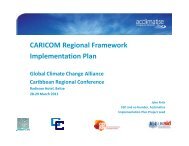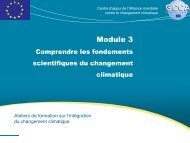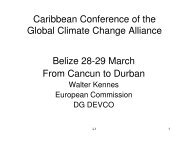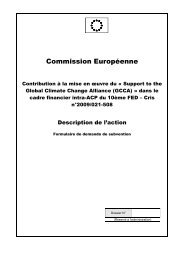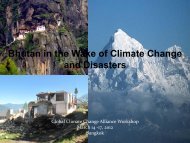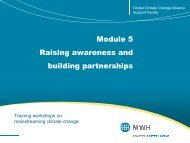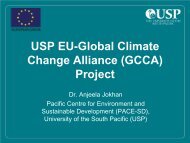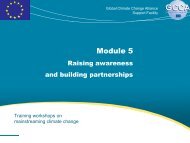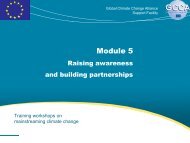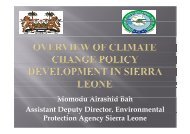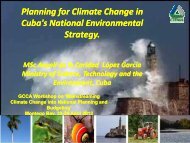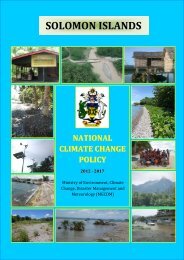Rwanda Green Growth Strategy 18nov11 - Global Climate Change ...
Rwanda Green Growth Strategy 18nov11 - Global Climate Change ...
Rwanda Green Growth Strategy 18nov11 - Global Climate Change ...
You also want an ePaper? Increase the reach of your titles
YUMPU automatically turns print PDFs into web optimized ePapers that Google loves.
Detailed Programmes of ActionProgramme 3: Integrated Water Resource ManagementResponsible Stakeholders (lead in bold)RNRA, MINIRENA, MININFRA, EWSA, REMA, MINALOC, MOHSummary of Programmes and Actions<strong>Rwanda</strong> is endowed with substantial freshwater resources. Regular rainfall patterns and minimalconsumption has, until now, not necessitated water storage, irrigation and monitoring. There is a clear gapof observed data and monitoring frameworks for <strong>Rwanda</strong>’s water and climate. The challenges of rapidpopulation growth, increased urbanisation and industry, environmental degradation and pollution are leadingto accelerated depletion and degradation of available water resources, while climate change is bringinguncertainty in future supply. <strong>Rwanda</strong> must consider downstream nations, primarily the beneficiaries of theKagera basin and riparian states of the Nile. Preserving environmental flows and protecting biodiversity willbecome increasingly difficult. Establishing a robust Integrated Water Resource Management (IWRM)framework that can better understand current and future abstraction, and better plan for and respond toimpacts of climate change is crucial to securing the nation’s water resources. Action 1: Establish National Integrated Water Resource Management (IWRM) framework<strong>Rwanda</strong> will prioritise establishing a robust national framework for Integrated Water Resource Management(IWRM) that establishes clear roles, responsibilities, and decision-making processes for all water-relatedactivities across the relevant sectors for improved coordination. The national framework will be coordinatedby the Integrated Water Resources Management Department under the <strong>Rwanda</strong> Natural ResourcesAuthority. An Inter-Ministerial Council will facilitate participatory mainstreaming processes in water usesectors. The national framework for IWRM will be cascaded down to district and catchment levels. It willinclude compliance and enforcement, information access polices and custodial arrangements. Action 2: District and Community Based Catchment Management under National IWRM FrameworkAs part of the National Land Use Planning and IWRM framework, <strong>Rwanda</strong> will integrate management ofwater resources at the district and community levels, define catchment wide responsibilities, clustercatchment partner-districts according to sub-catchment regions, and improve understanding of water userswithin districts and catchments. These actions will ensure a common management and service deliveryframework. Water User Associations will also be established to ensure responsible and equitable water useat the community level. Action 3: Understanding the Water Balance: Monitoring, Modeling and Analysis, InformationManagementTo allow precise planning of water resources and improved allocation, <strong>Rwanda</strong> will develop water balancesat district and catchment levels, supported by hydrological models, improved rainfall monitoring, a betterunderstanding of agro-meteorology and water quality testing. The important national water datasets will beidentified to enable monitoring of the water balance, model abstraction and future demand. Furthermore,assessments will be undertaken of water resources under a range of climate change scenarios. Action 4: Water security through efficiency and conservation<strong>Rwanda</strong> will establish a comprehensive National Water Security Plan to expand water storage and irrigationinfrastructure, rainwater harvesting, water conservation and water efficiency practices. The plan will bringtogether the national policies and strategies for irrigation, water supply and sanitation, IWRM and energy.<strong>Rwanda</strong> will investigate available water efficient use and water recycling technologies, and waterconservation practices for domestic, industrial and agricultural uses. <strong>Rwanda</strong> will mainstream water savingtechnologies and practices into the planning system, EIA/EMPs and building codes.60Government of <strong>Rwanda</strong>



